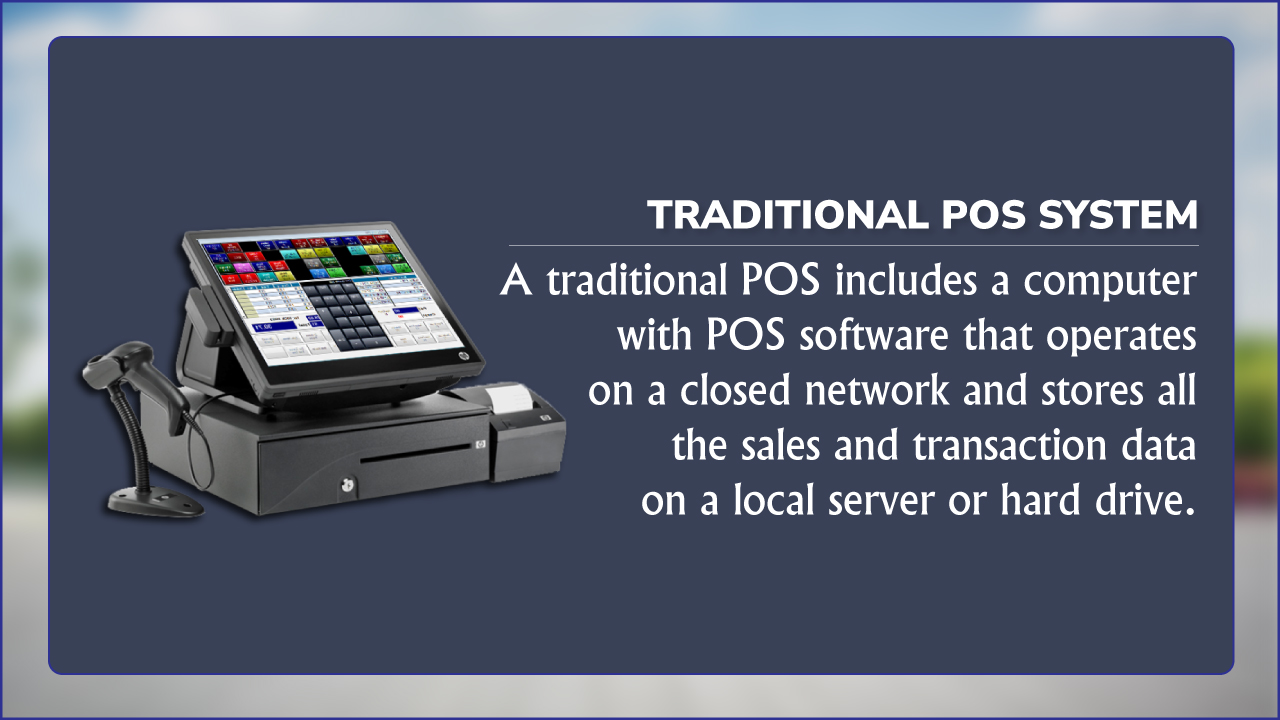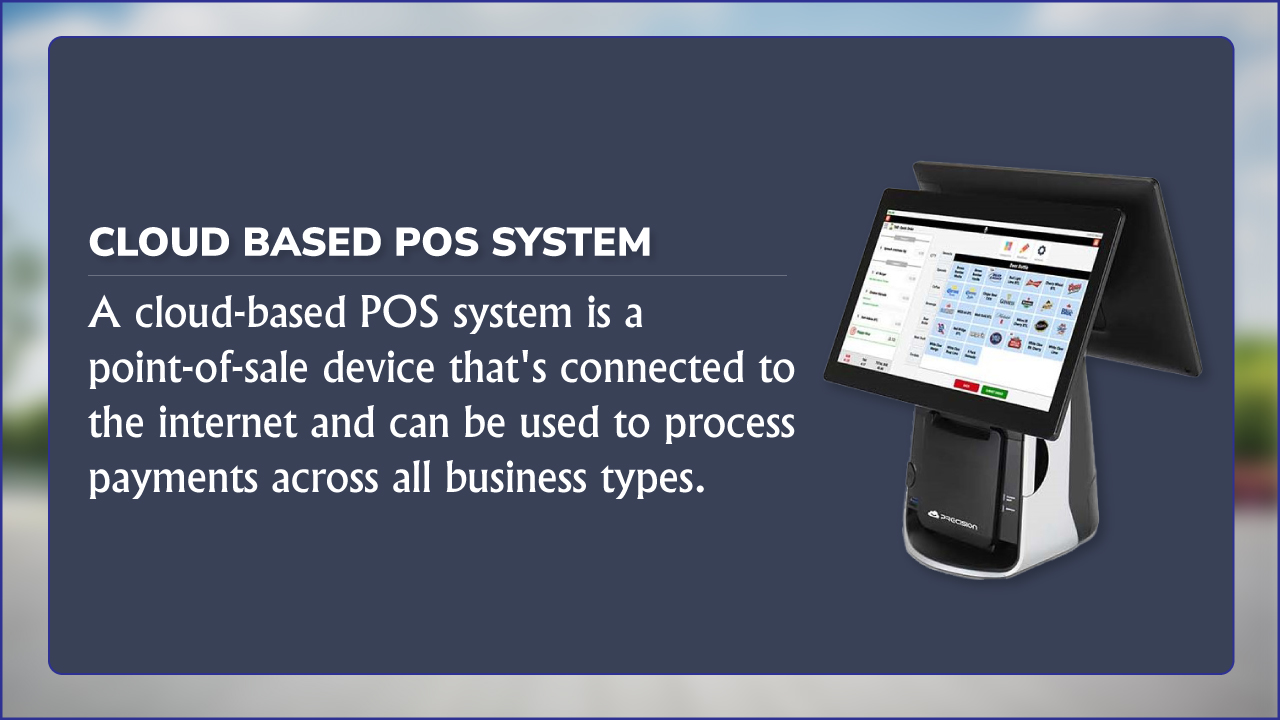
Traditional POS and Cloud-Based POS Systems: Finding the Perfect Fit for Your Business
When it comes to managing sales transactions in today’s market, selecting the right Point of Sale (POS) system can be pivotal. Traditionally, businesses have relied on physical, onsite systems known as traditional POS. However, with the advancement of technology, cloud-based POS systems have emerged as a compelling alternative.
Both systems offer distinct advantages, but the choice between traditional and cloud-based solutions can significantly impact the efficiency and flexibility of business operations. This blog aims to explore the differences, benefits, and potential drawbacks of each, helping you make an informed decision tailored to your business needs.
Understanding Traditional POS Systems
Definition of Traditional POS
A Traditional Point of Sale (POS) system, often referred to as an “on-premise” POS, consists of physical hardware set up at a business location. This usually includes cash registers, desktop computers, and servers that host the POS software onsite. The key characteristic is that all data processing occurs on local servers and is stored on local databases. The usage and maintenance of these systems require direct handling by the personnel or IT staff of the retail or hospitality business.
Features of Traditional POS
Traditional POS systems typically offer robust functionality tailored to specific business needs. Key features often include:
1. Reliability and Hands-On Control
Traditional POS systems are renowned for their reliability and hands-on control, providing business owners with a sense of security and stability in their operations. This reliability stems from the use of physical hardware and locally hosted software, ensuring consistent performance even in offline environments.
2. Robust Functionality
Traditional POS systems offer robust functionality tailored to specific business needs, providing essential features for sales transactions, inventory management, and reporting. From processing payments to tracking stock levels, traditional POS systems empower businesses to streamline operations and improve efficiency.
3. Customizable Hardware Setups
Traditional POS systems support customizable hardware setups, allowing businesses to configure their systems according to their unique requirements. This includes options for multiple cash drawers, receipt printers, barcode scanners, and other peripherals, enabling businesses to tailor their POS setup to suit their workflow and space constraints.
4. In-Depth Inventory Management
Traditional POS systems feature in-depth inventory management capabilities that can handle complex scenarios without requiring an internet connection. This includes tracking stock levels, managing product variants and attributes, setting reorder points, and generating reports to optimize inventory control and forecasting.
5. High Levels of Security
Traditional POS systems offer high levels of security by keeping all data in-house, reducing the potential exposure to external breaches. With data stored locally on servers within the business premises, traditional POS systems mitigate the risks associated with cloud-based storage and remote access, providing peace of mind to business owners and customers alike.
6. Long-Term Cost Savings
Traditional POS systems offer long-term cost savings for businesses that prefer not to rely on ongoing subscription models. While the upfront costs may be higher compared to cloud-based solutions, traditional POS systems typically incur lower ongoing expenses, such as subscription fees and data storage costs, resulting in greater cost efficiency over time.
Limitation of Traditional POS
While traditional POS systems boast exceptional features, they also come with limitations. These flaws in traditional POS systems include:
- Limited accessibility, confined to the physical location.
- Higher upfront costs for hardware, software, and infrastructure.
- Ongoing maintenance and IT support required.
- Complexity and cost are associated with scalability.
- Vulnerability to data loss and security breaches due to on-premises storage.
Exploring Cloud-Based POS Systems
Definition of Cloud-Based POS
Cloud-Based POS systems represent a more modern approach by operating on an internet infrastructure. Essentially, this type of POS stores all the business’s transaction data on remote servers (in the cloud) and can be accessed real-time across multiple devices connected to the web, such as tablets, mobile phones, or laptops. There is no need for significant physical hardware investments at the business location, making it adaptable and scalable.
Advantages of Cloud-Based POS
The flexibility and accessibility offered by cloud-based POS systems yield numerous benefits:
1. Lower Upfront Costs
Cloud-based POS systems typically require minimal upfront investment compared to traditional systems, as they eliminate the need for extensive onsite hardware setups. This lowers the barrier to entry for small businesses and startups, allowing them to adopt advanced POS technology without breaking the bank.
2. Flexibility and Accessibility
Cloud-based POS systems offer unparalleled flexibility and accessibility, allowing business owners to access real-time data from any location with an internet connection. This enhances management flexibility, enabling quick decision-making and efficient operations management.
3. Seamless Integration
Cloud-based POS systems seamlessly integrate with a wide range of third-party applications, including accounting software, inventory management tools, and e-commerce platforms. This enables businesses to expand their operational capabilities and streamline workflows by centralizing data across multiple systems.
4. Automatic Software Updates
Cloud-based POS systems receive automatic software updates from the service provider, ensuring that features and security measures are always current. This eliminates the need for manual updates and reduces the risk of system vulnerabilities, providing peace of mind to business owners.
5. Scalability
Cloud-based POS systems are highly scalable, allowing businesses to easily scale up or down based on their growth trajectory. Whether opening new locations, expanding product lines, or accommodating seasonal fluctuations, cloud-based POS systems can adapt to changing business needs without the need for costly hardware upgrades.
6. Enhanced Security
Data stored in the cloud is encrypted and backed up regularly, providing robust protection against data loss, theft, or breaches. Cloud-based POS systems often employ advanced security protocols and compliance standards, ensuring the integrity and confidentiality of sensitive information.
7. Mobility
Cloud-based POS systems enable business owners and staff to access sales data, inventory information, and reports on-the-go via mobile devices. This mobility empowers businesses to serve customers more efficiently, whether on the shop floor, at events, or during off-site appointments.
8. Remote Management
With cloud-based POS systems, businesses can manage multiple locations or branches centrally from a single dashboard. This streamlines operations, ensures consistency across the organization, and facilitates remote troubleshooting and support.
9. Enhanced Customer Experience
Cloud-based POS systems enable businesses to offer faster transaction processing, personalized services, and loyalty programs. By capturing customer data and preferences, businesses can deliver targeted promotions, recommendations, and rewards, enhancing overall customer satisfaction and loyalty.
10. Improved Insights and Analytics
Cloud-based POS systems provide robust reporting and analytics capabilities, allowing businesses to gain valuable insights into sales trends, inventory performance, and customer behavior. This data-driven approach enables informed decision-making, strategic planning, and optimization of business operations.
Considerations when Choosing Cloud-Based POS
While cloud-based POS systems offer substantial conveniences, certain considerations should be taken into account:
- Dependence on a stable and continuous internet connection is critical.
- Subscription pricing models may lead to higher long-term costs.
- Data security relies on the cloud provider’s protocols, which necessitates careful selection based on credibility and service history.
- Adjusting to cloud POS from traditional systems may require some training and transition time for staff.
In summary, when evaluating both traditional and cloud-based POS systems, businesses should weigh their specific operational priorities, budget constraints, and scalability needs to choose the right type that best suits their workflows and growth plans.
Comparison Between Traditional and Cloud-Based POS Systems
| Aspect | Traditional POS Systems | Cloud-Based POS Systems |
| Accessibility | Confined to the physical location. | Accessible remotely from any internet-enabled device. |
| Upfront Costs | Higher due to hardware, software, and infrastructure. | Lower initial investment, subscription-based pricing model. |
| Maintenance | Ongoing maintenance and IT support required. | Minimal maintenance, updates managed by the service provider. |
| Scalability | Complex and costly to scale up or customize. | Easily scalable, can add features and users as needed. |
| Data Security | Vulnerable to data loss and breaches due to on-premise storage. | Enhanced security measures with data stored in the cloud. |
| Integration | Limited integration capabilities with other business systems. | Seamless integration with various third-party applications and services. |
| Flexibility | Limited flexibility to adapt to changing business needs. | Greater flexibility to customize and configure according to business requirements. |
| Accessibility of Updates | Updates and upgrades may require manual installation and downtime. | Automatic updates deployed seamlessly without disrupting operations. |
| Reliability | Reliability may be impacted by hardware failures or network issues. | High reliability with minimal downtime, data backups, and redundancy in place. |
| Cost of Ownership | Higher long-term costs due to maintenance, upgrades, and potential hardware replacements. | Lower total cost of ownership with predictable subscription fees and reduced maintenance costs. |
Factors to Consider When Choosing Between Traditional and Cloud-Based POS
Nature of Business
The specific needs of your business play a crucial role in this decision. For instance, if your business demands mobility and flexibility, such as in the case of pop-up shops or food trucks, a cloud-based POS might be ideal. However, for businesses like small local stores with a stable and predictable customer base, a traditional POS could suffice.
Budget Constraints
Budget is another important consideration. Initially, traditional POS systems may require a larger upfront investment for hardware and software. Conversely, cloud-based systems typically operate on a subscription model, which might seem more manageable as it spreads the cost over time. However, it’s important to consider the long-term costs associated with each system, including maintenance and updates.
Future Growth Plans
Lastly, consider your long-term business goals and potential growth. Cloud-based POS systems offer scalability and ease of updates which can be beneficial for rapidly growing businesses. They allow you to easily add new features or expand your operations without significant system overhauls. In contrast, scaling up with a traditional POS system often involves more complex upgrades and higher costs.
By carefully evaluating these factors, businesses can make a more informed decision that aligns with their specific operational needs and goals.
Conclusion
In deciding between traditional and cloud-based POS systems, it’s essential to evaluate your business needs, budget, and long-term goals. Traditional POS systems offer robustness and reliability without reliance on internet connectivity, making them a great choice for locations with unstable internet. However, cloud-based POS systems are gaining the edge for businesses seeking flexibility, real-time updates, and lower upfront costs. The scalability and ease of integration with other cloud services make cloud POS a compelling option for dynamic businesses that prioritize growth and innovation. Ultimately, the choice comes down to your specific business scenario and which system aligns more effectively with your operational strategies.


